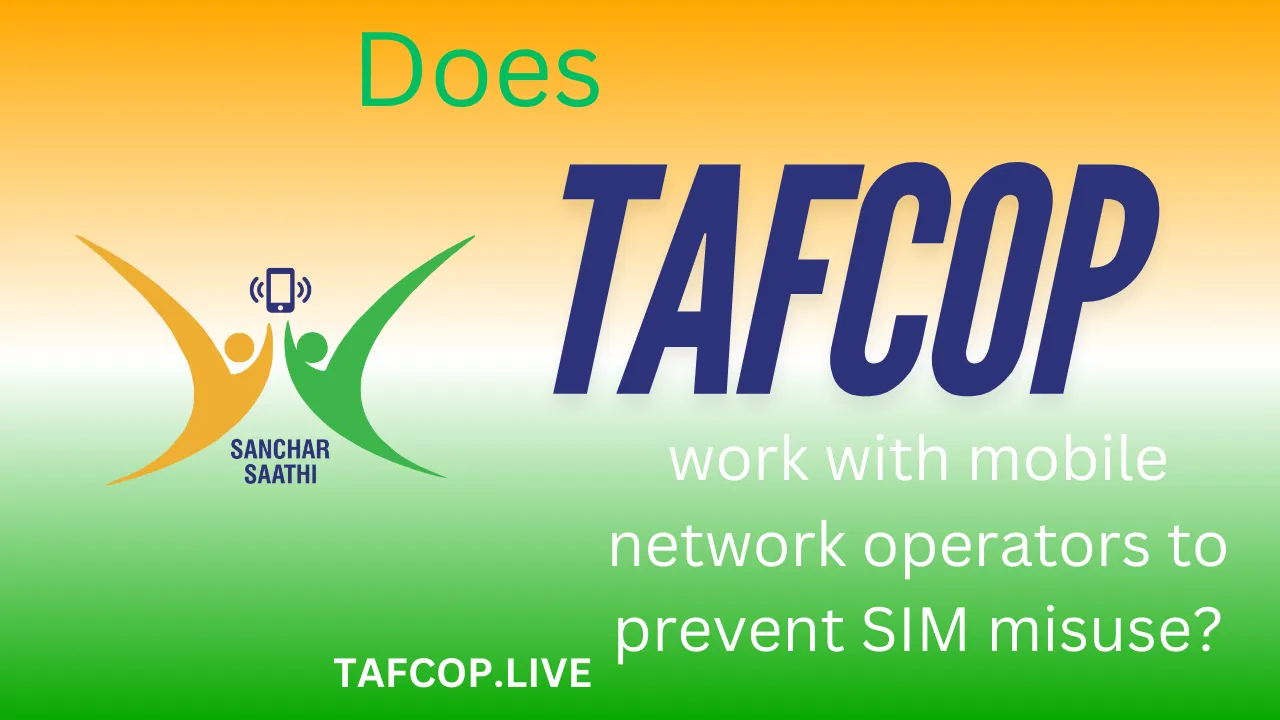In a world where our lives are increasingly intertwined with technology, the humble SIM card has become a gateway to our digital existence. From banking to social media, our SIM cards hold the keys to our most sensitive information. But what happens when these tiny chips fall into the wrong hands? Enter TAFCOP, a name that’s been buzzing in the corridors of telecom regulation and cybersecurity. But does TAFCOP really work with mobile network operators to prevent SIM misuse? Let’s dive into the heart of the matter.
Does TAFCOP work with mobile network operators to prevent SIM misuse?
Yes, TAFCOP actively collaborates with mobile network operators in India to prevent SIM misuse. By leveraging advanced technologies and regulatory frameworks, TAFCOP ensures that telecom operators adhere to strict guidelines, making it harder for fraudsters to exploit SIM cards for illegal activities. This partnership is crucial in a country like India, where SIM card fraud is a growing concern
TAFCOP works closely with mobile network operators in India to prevent SIM misuse by enforcing strict regulatory guidelines and leveraging advanced technologies. This collaboration helps curb illegal activities like fake SIM registrations, SIM cloning, and unauthorized usage, ensuring a safer telecom ecosystem.
How Does TAFCOP Collaborate with Mobile Network Operators?
When it comes to preventing SIM misuse, collaboration is key. TAFCOP doesn’t work in isolation; it partners with mobile network operators to create a robust system that deters fraud. But how exactly does this partnership work?
TAFCOP provides mobile network operators with tools and frameworks to monitor and regulate SIM card usage. For instance, operators are required to verify customer identities through Aadhaar-based e-KYC (Electronic Know Your Customer) processes. This ensures that every SIM card is linked to a verified individual, making it harder for fraudsters to operate anonymously.
Take the case of a recent scam in Mumbai where a group of individuals was using fake SIM cards to conduct phishing attacks. Thanks to TAFCOP’s guidelines, the mobile operator was able to quickly identify and deactivate these fraudulent SIMs, preventing further damage. This is just one example of how TAFCOP’s collaboration with operators is making a difference.
What Are the Key Measures TAFCOP Implements to Prevent SIM Misuse?
Preventing SIM misuse isn’t just about catching fraudsters after the fact; it’s about creating systems that make fraud difficult in the first place. So, what are the key measures TAFCOP has put in place?
TAFCOP enforces strict limits on the number of SIMs an individual can hold. In India, the current limit is nine SIMs per person. This measure prevents bulk purchases of SIM cards, which are often used for illegal activities. Additionally, TAFCOP mandates real-time monitoring of SIM card usage to detect suspicious patterns.
For example, if a single SIM card is suddenly used to make hundreds of calls in a short period, the system flags it for review. This proactive approach helps nip potential fraud in the bud.
Why Is SIM Misuse a Growing Concern in India?
India’s telecom sector is one of the largest in the world, with over 1.2 billion mobile subscribers. While this growth is impressive, it also brings challenges, particularly when it comes to SIM misuse. But why is this such a big deal?
SIM misuse is a gateway to more serious crimes like identity theft, financial fraud, and even terrorism. Fraudsters often use fake or cloned SIM cards to bypass security measures, making it difficult for authorities to trace their activities.
Consider the case of a small business owner in Delhi who lost lakhs of rupees because a fraudster used a cloned SIM card to intercept OTPs (One-Time Passwords) and access his bank account. Stories like these highlight the urgent need for measures like those implemented by TAFCOP.
What Role Do Mobile Network Operators Play in Preventing SIM Misuse?
Mobile network operators are the first line of defense against SIM misuse. But what exactly is their role in this battle?
Operators are responsible for implementing TAFCOP’s guidelines at the ground level. This includes verifying customer identities, monitoring SIM usage, and reporting suspicious activities to authorities.
For instance, when a customer walks into a store to buy a SIM card, the operator must verify their identity using Aadhaar or other government-issued documents. This step ensures that every SIM card is linked to a real person, making it harder for fraudsters to operate anonymously.
How Effective Is TAFCOP in Curbing SIM Misuse?
With all these measures in place, the big question is: how effective is TAFCOP really?
TAFCOP has significantly reduced instances of SIM misuse in India. According to recent data, the number of reported SIM fraud cases has dropped by 30% since TAFCOP’s guidelines were implemented.
However, challenges remain. Fraudsters are constantly finding new ways to bypass security measures, which means TAFCOP and mobile operators must stay one step ahead. Continuous innovation and collaboration are key to maintaining this progress.
What Are the Challenges in Preventing SIM Misuse?
While TAFCOP’s efforts are commendable, preventing SIM misuse is no easy task. What are the biggest challenges in this fight?
One major challenge is the sheer scale of India’s telecom sector. With over a billion subscribers, monitoring every SIM card is a daunting task. Additionally, fraudsters are becoming increasingly sophisticated, using advanced techniques to bypass security measures.
Another challenge is the lack of awareness among consumers. Many people don’t realize the risks associated with SIM misuse until it’s too late. Educating the public is crucial to winning this battle.
FAQs
1. What is TAFCOP?
TAFCOP is a regulatory body in India that works with mobile network operators to prevent SIM misuse and ensure a secure telecom ecosystem.
2. How does TAFCOP verify SIM card users?
TAFCOP mandates Aadhaar-based e-KYC processes to verify the identity of every SIM card user.
3. Can I hold more than nine SIM cards in India?
No, the current limit is nine SIM cards per person to prevent bulk purchases for illegal activities.
4. What should I do if I suspect SIM misuse?
Contact your mobile network operator immediately and report the issue to the authorities.
Conclusion
In a world where technology is both a blessing and a curse, organizations like TAFCOP play a crucial role in keeping us safe. By working closely with mobile network operators, TAFCOP has made significant strides in preventing SIM misuse in India. However, the fight is far from over. As fraudsters continue to evolve, so must our defenses. The key lies in collaboration, innovation, and awareness. After all, a safer digital world is in everyone’s best interest.
“In the battle against SIM misuse, vigilance is our greatest weapon.”
| Key Measures by TAFCOP | Impact |
|---|---|
| Aadhaar-based e-KYC | Ensures verified SIM card users |
| Limit of 9 SIMs per person | Prevents bulk purchases for fraud |
| Real-time monitoring | Detects and flags suspicious activities |
By following these guidelines and staying informed, we can all contribute to a safer telecom ecosystem. After all, prevention is always better than cure.

